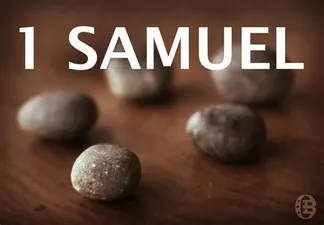I Samuel 8
I’m unfamiliar with large swathes of the Old Testament. Or if
not unfamiliar, at least like a pond where the sediment needs to be stirred. A lot of it comes back to me when I start reading in I
Samuel. It’s a famous passage where the children of Israel ask Samuel, the priest,
for a king to rule over them. Samuel’s sons were judges in Beersheba but were
known for their graft.
“Then all
the elders of Israel gathered together and came to Samuel at Ramah, and said to
him, ‘Look, you are old, and your sons do not walk in your ways. Now make us
king to judge us like all the nations”. (4-5)
When this story is told in Sunday school classes it’s
usually accompanied by a warning to those ‘foolish’ Israelites. Samuel as well
gives them a lecture about what’s to be expected when electing a king. He tries
to talk them out of it. But I’m sympathetic to their concerns. Who wants to
live under leaders that are knowingly corrupt? That’s why they started with a
complaint about Samuel’s sons, the future judges of their country. And I can
guarantee it wasn’t as clean as the text makes it sound. I think the people let
him know that this was at least somewhat his fault.
That’s just me reading into this story.
It makes sense. Large companies run like this sometimes. A
competent CEO prepares to step down and hand the business over to his son. The
son’s always been someone who couldn’t organize a beer run for a tailgate
party, let alone make consequential decisions. Nervousness sets in with the
executives as they plead with the old man to consider an alternative. What they
never say, but really could, is that this is kind of your fault sir.
But here is where the story takes a turn. Samuel hears their
complaints and prays to God. “And the Lord said to Samuel, Heed the voice of
the people in all that they say to you; for they have not rejected you, but
they have rejected Me, that I should not reign over them.” (verse 7) We would
expect God to say something to Samuel not raising up the next generation right.
But God knew the heart of the matter was not corrupt leaders, it was a
collective hardness of heart among His people that created selfish leaders.
Corruption grows in the soil that surrounds it. In other
words, the same culture that rejected God’s commandments, permitted corrupt
judges. This doesn’t let Samuel’s kids (Joel and Abijah) off for the hook. But
it does point to a lack of the fear of the Lord in the hearts of the people.
Samuel’s sons were
not capable of judging righteously because they didn’t follow God. Samuel
represented the last of the honest, God fearing servants in the land. He
managed to paper over the cracks of his sons’ dishonesty while alive, but how
long can that go on?
We all get disgusted by selfish people who take advantage of
those they’re supposed to watch over. This is true in all areas of life,
business, entertainment and nonprofits. But corrupt leaders don’t just fall out
of the sky. There are warning signs at an earlier stage of development. Think
of the talented football player that keeps getting off with a warning when the
police arrest him for DUI or vandalism. Without accountability, anyone is a
potential victim of their recklessness. They learn no lessons except that
someone will handle it.
Individuals are responsible for their own behavior, always.
But societies get more of what they permit in their leaders. It looks like
Israel, in the time of Samuel, is no different. God tells him to explain to the
people what having a king will mean.
“He will
take your sons and appoint them for his own chariots and to be his horsemen, and
some will run before his chariots, he will appoint captains over his thousands
and captains over his fifties, will set some to plow his ground and reap his
harvest, and some to make weapons of war and equipment for chariots. He will
take your daughters to be perfumers, cooks, and bakers. And he will take the
best of your fields, your vineyards, and your olive groves, and give them to
his servants. (11-15)
It goes on like this for another 3 or 4 verses. This is God
saying ‘you think you’ve got it bad now, just wait’. The crux of their problem
with judges (God’s appointed rulers) is the lack of honesty they exhibit. But
under a king, the people give up so much more. And, they get to pick a king
from the same group of dishonest leaders. I love they respond though,
essentially “We want a king like everyone else to fight our battles.”
It’s like when the contractor tells you that pool you want
to build won’t work because your ground is too sandy. You say “So…when can you
start?”
The short lesson is this, if you’re seeing rampant
corruption in leaders you need to look deeper. Chances are the culture is
rotten and permitting of it at multiple levels. This isn’t moral relativism,
but it would help to root it out closer to home first. We don’t have a fear of
God and it shows up in various ways when we let corruption slide.
The children of Israel never went back to the judges model.
I’m sure they wished at times for a simpler, less invasive, style of
government. But even in their ignorance He rescued them from total destruction
and raised up Godly leaders.

No comments:
Post a Comment